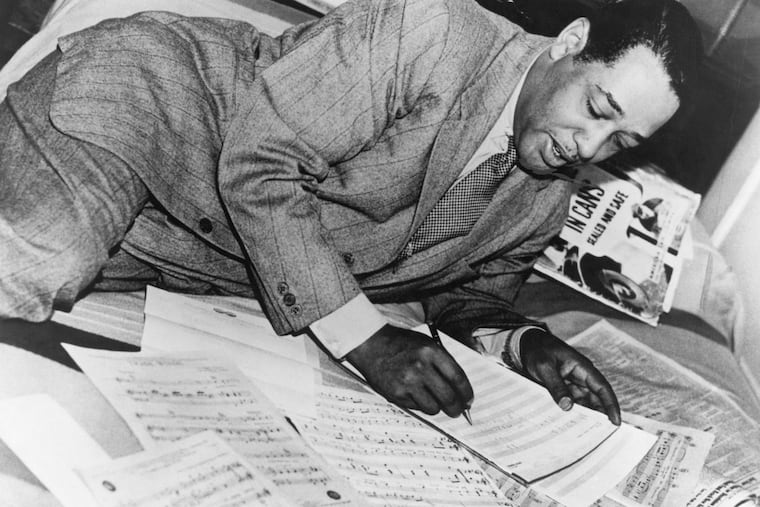Obsessed with Duke Ellington, one man is determined to illuminate the jazz composer’s stunning output
“I’m going to be 72 this year and writing all these books is going to take a while, but I gotta do it. I don’t want to die with all this knowledge inside me and not pass it on.”

Ask David Berger about his lifelong obsession with the music of Duke Ellington, and he’ll tell you, “Duke is the best storyteller that jazz has ever had. He’s got 1,500 stories out there” — meaning songs, said Berger, a jazz composer, arranger, and bandleader.
Even casual listeners are familiar with Ellington standards, such as “Mood Indigo” and “Sophisticated Lady.” But these are only a fraction of a staggering output that ranges freely across genres and a six-decade career: from funky, low-down blues and hot dance tunes to majestic spirituals; from film sound tracks and Broadway musicals to extended symphonic works, even a ballet.
For Berger, this sprawling, all-encompassing body of work is the stamp of a uniquely and quintessentially American artist as universal and timeless as Shakespeare (who, in fact, Ellington once adapted in a 1957 jazz suite of musical vignettes called “Such Sweet Thunder”).
Berger is a prolific author and educator with several acclaimed books about arranging and composing. Now, he has embarked on a five-volume book project, “The Ellington Effect,” which explores the creative process of the native Washingtonian, with in-depth explications of representative songs.
Berger, 71, lives on Duke Ellington Boulevard in Manhattan. Above the piano in his apartment is a painting by Ellington. In his office hangs a poster of the Duke by a Polish artist. Simply put, his life is Ellington.
“There’s a depth and breadth to this music,” he said. “It affects us emotionally, and it’s deeply connected to our culture.”
Ellington is one of the most written-about figures in American music, but Berger sees a need for serious scholarship of the sort accorded to classical composers. “There’s not a lot of deep analyses of the pieces he wrote,” Berger said. “There are plenty of books that talk about his life, but you don’t really get an understanding of his art. I want to talk about his art.”
Said John Edward Hasse, curator emeritus of American music at the Smithsonian, “What David proposes — to subject dozens of Ellington’s works to lengthy and detailed explanation — is unprecedented. I expect this project will set new standards and inspire students, educators, and musicians for decades to come.”
Berger’s meeting with his idol remains a red-letter day in his life. It was in the early ’70s and a friend who had joined Ellington’s band invited Berger to a recording session. “Duke had a vibe and an aura and such charisma that it made the energy in the room go off the charts,” recalled Berger, whose friend introduced him as an arranger to Ellington, seated regally at his piano. “Duke says, ‘Well, I must take a lesson from you some time.’ Great, right? You gotta love it!”
Ellington was famous for using street sounds in his music: car horns, church moans, train whistles, even a mynah bird that he heard singing outside a hotel on tour in the Middle East. In one of Berger’s favorites, “Harlem Air Shaft,” Ellington constructs an entire composition — a sort of mini street-symphony — from the ambience and racket of a tenement building in Harlem. “So you hear the people fighting and you smell everybody’s cooking and you hear radios from all the apartments playing all these different styles of music, and he integrates them brilliantly into a singular piece,” Berger says.
Berger, a trumpet player, once led his own band before joining his idol’s Famous Orchestra shortly after Ellington died, when it was led by his son, Mercer. In the decades since, Berger has become a leading authority on Ellington’s music. In the late ’80s and ’90s, he was conductor of the Jazz at Lincoln Center Orchestra, where he collaborated with Wynton Marsalis. He has transcribed more than 500 Ellington compositions, and he has performed throughout the United States and Europe.
The impulse to forge ahead with the ambitious — even he would admit, somewhat quixotic — five-volume series came about, at least in part, because Berger is feeling his mortality. “It needs to be done,” he says. “I’m going to be 72 this year and writing all these books is going to take a while, but I gotta do it. I don’t want to die with all this knowledge inside me and not pass it on.”
Berger hopes that his work can help bridge the generation gap in the same way Ellington’s music has broken through cultural barriers across the globe. “For young people,” he says, “this is like a foreign language, and I want to help them learn this language and appreciate it the way that I do.”